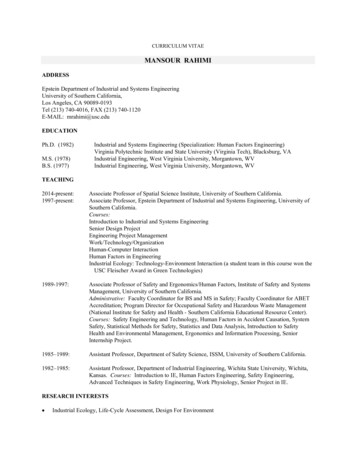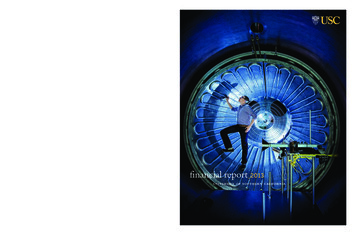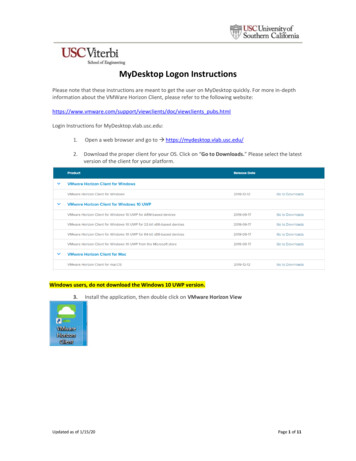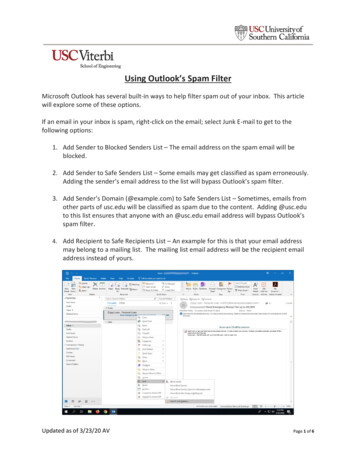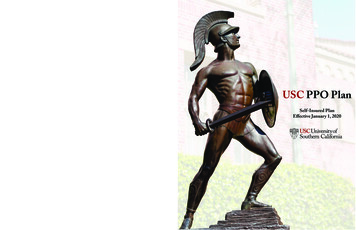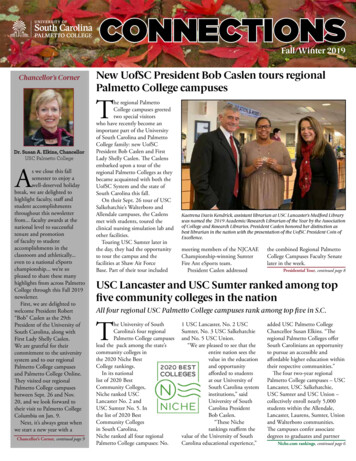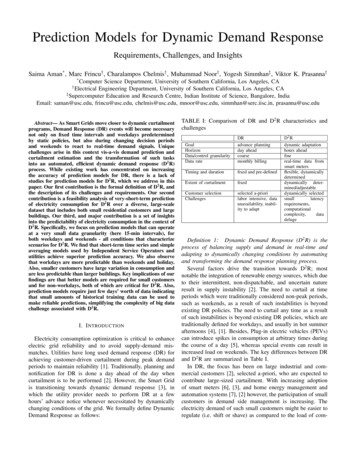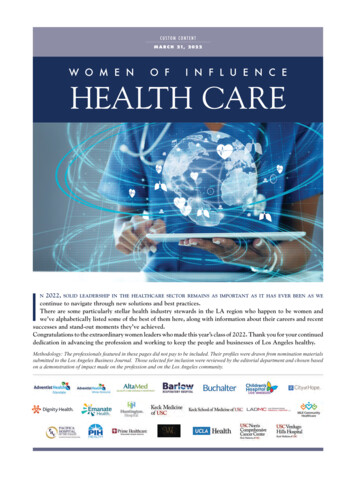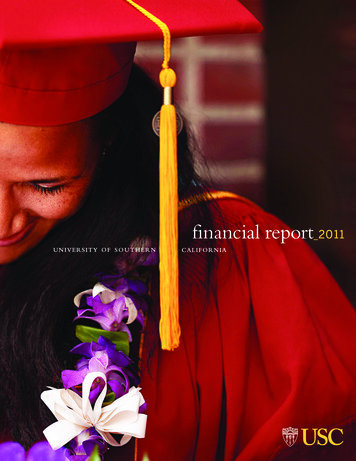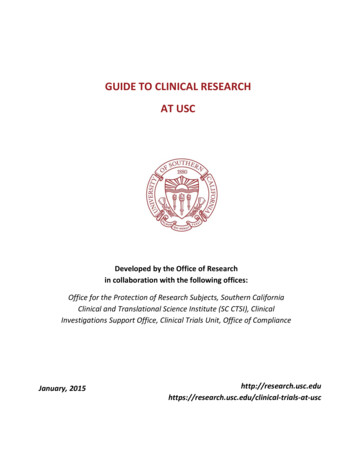
Transcription
GUIDE TO CLINICAL RESEARCHAT USCDeveloped by the Office of Researchin collaboration with the following offices:Office for the Protection of Research Subjects, Southern CaliforniaClinical and Translational Science Institute (SC CTSI), ClinicalInvestigations Support Office, Clinical Trials Unit, Office of ComplianceJanuary, u/clinical‐trials‐at‐usc
GUIDE TO CLINICAL RESEARCH AT USCCongratulations! You have taken the initiative to educate yourself on the process of conducting studiesinvolving human subjects at the University of Southern California. The purpose of this Guide is toprovide you, the Principal Investigator, as well as your project managers, research and nursecoordinators or administrators, and all those associated with clinical trials, with an overview of theprocesses, committees and departments that you will work with throughout the submission, review,approval and conduct of your human subject study or clinical trial.It also highlights important resources available to you at USC as you design and conduct your studies.Significant efforts are currently being made at USC to streamline and improve our human subjectsresearch protocol submission and approval process. This is a revised version of the original guidecreated in 2013.We very much welcome and value your insights and experience – any comments or suggestions toimprove upon our submission process can be submitted to Vprsch@usc.edu.Randolph HallVice President, Research
GUIDE TO CLINICAL RESEARCH AT USCTABLE OF CONTENTSPAGEI.UNIVERSITY ENTITIES & RESOURCES .31. Offices & Entities . . 42. Ancillary Committees . .113. Other Entities & Resources . . 15II.USC CLINICAL TRIALS OFFICE (CTO) . .181. Introduction .192. Contract Review, Negotiation and Execution . . .193. Coverage Analysis (CA) .204. Budget Development and Negotiation 215. From CDA to Clinical Trial Agreement and Study Activation . 216. Roles of the Study Team . 22III.COMPLIANCE .251. Considerations Related to Clinical Trials . .262. HIPAA Privacy Rule .263. Clinical Trials Billing . .294. Conflict of Interest Related to Research . . 315. Confidentiality Agreements and Clauses .32IV.PROTECTING HUMAN RESEARCH SUBJECTS .361. Human Subjects Research Overview . .372. Regulatory Authorities . . .383. Review and Approval of Research 404. Summary of the IRB Submission Process for Clinical Trials at USC .535. References . .53V.PLANNING, DEVELOPMENT AND ACTIVATION OF A CLINICAL TRIAL PROTOCOL . . 551. Introduction .562. Designing and Writing an Investigator Initiated Clinical Trial Protocol .563. Steps for Submission and Activation of a New Clinical Trial Protocol .66a. Flow Chart: Life Cycle – Industry‐Sponsored Trial 68b. Flow Chart: Life cycle – Investigator‐Initiated Trial 69Page 1
GUIDE TO CLINICAL RESEARCH AT USCc. Flow Chart: Clinical Investigations Committee (CIC) ProtocolReview Process 70d. Flow Chart: Non‐Cancer protocol Submission Process 74VI.COORDINATION OF ANCILLARY SERVICES/SUPPORT .791. Introduction 802. Radiology & Imaging . .803. Pharmacy 864. Pathology . .885. Clinical Trials Unit (CTU) . 916. Biostatistics 947. Cardiology .988. Ophthalmology .1009. Primary Contacts for Accessing Ancillary Services or Support .103VII.APPENDICES .IAppendix 1: Flow Chart: Clinical Trials at USC .iAppendix 2: Flow Chart: Cancer‐Related Clinical Trials at USC . iiAppendix 3: Clinical Research Roles . .iiiAppendix 4: Research Facilities & Core Laboratories .ixAppendix 5: CTO Scope of Services . xiiAppendix 6: Definitions . xviAppendix 7: Acronyms . . .xxivPage 2
GUIDE TO CLINICAL RESEARCH AT USCI. UNIVERSITY ENTITIES & RESOURCES1. Offices & Entities Keck School of Medicine (KSOM) LA County USC Hospital Clinical Trials Office (CTO) Clinical Investigations Support Office (CISO) Office for the Protection of Research Subjects (OPRS) Institutional Review Board (IRB) USC Investigational Drug Services Pharmacy Southern California Clinical and Translational Science Institute (SC‐CTSI) Office of Compliance (OOC) Sponsored Projects Accounting (SPA)2. Ancillary Committees Institutional Biosafety Committee (IBC) Radiation Safety Committee (RSC) Stem Cell Research Oversight Committee (SCRO) Conflict of Interest Review Committee (CRIC) Clinical Investigations Committee (CIC) Quality Assurance Monitoring Committee (QAMC) Data and Safety Monitoring Committee (DSMC) Phase I Committee3. Other Entities & Resources Cancer Center Database (CAFÉ) Research Facilities & Core Laboratories at USC Office of Research Administration (KSOM) USC Office of Research Department of Contracts and Grants (DCG) USC Stevens CenterPage 3
GUIDE TO CLINICAL RESEARCH AT USC1. OFFICES AND ENTITIESThis chapter provides an overview of the offices, entities and ancillary committees at USCassociated with Human Subject Research (HSR). The scope of activities encompassed by HSR isvery broad and includes scientific, investigatory and research activities involving humansubjects, clinical data, or any materials (including tissues, serum, cells, and DNA) from anyhuman source, whether specimens are from a known, specified individual or are "de‐identified."KECK SCHOOL OF MEDICINE (KSOM)Established in 1885 and located at the Heath Science Campus (HSC), the Keck School ofMedicine is the oldest medical school in Southern California and is home to the Keck MedicalCenter, which is composed of three USC‐owned hospitals: Keck Hospital of USC (formerly USC University Hospital) is a private research andteaching hospital staffed by more than 500 physicians who are also faculty of USC's KeckSchool of Medicine. The hospital’s 18 departments, individual clinical programs andintegrated clinical and business services provide support to USC’s academic physicians.USC Norris Comprehensive Cancer Center and Hospital, a 60‐bed inpatient facility,features a bone marrow transplantation unit and a surgical unit exclusively designatedto cancer research and patient acute and critical care.USC Verdugo Hills Hospital is a 158‐bed hospital in Glendale staffed by USC facultyphysicians. Services include a 24‐hour emergency room, a primary stroke center,bariatric and minimally invasive surgery, OB‐GYN and infant services, orthopedicsurgery, occupational, physical and speech therapy, cardiac rehabilitation, and imagingand diagnostic services including mammograms, magnetic resonance imaging (MRI), CTscans and angiograms.In addition, the Department of Pediatrics of Children’s Hospital, Los Angeles (CHLA) is thelargest department within the USC Keck School of Medicine. CHLA has been affiliated withKSOM since 1932. CHLA’s Department of Pediatrics is composed of 20 divisions, including bonemarrow transplant and a pediatric intensive care unit. Their Department of Surgery is one ofthe country’s most comprehensive, encompassing nine divisions, including five solid organtransplant programs (heart, lung, liver, intestine and kidney). In 1992, the CHLA ResearchInstitute became the Saban Research Institute, which houses over 150,000 sq. ft. of researchspace and provides investigators with core facilities that include: moleculargenomics/microarray, gene targeting and pathology, proteomics, biostatistics, GoodManufacturing Practice (GMP) in cell therapy, cellular imaging, fluorescence activation cellPage 4
GUIDE TO CLINICAL RESEARCH AT USCsorting (FACS), stem cell, vector and research imaging. The hospital’s The Clinical InvestigationCenter and the Clinical Trials Unit support clinical research while the Office of ResearchAdvancement and Administration provides centralized support for all aspects of our research.Additional KSOM research affiliates and medical centers include: Healthcare Consultation Centers (HCC) 1, 2 and 4House Ear InstituteKeck Medicine of USC Downtown Los AngelesKeck Medicine of USC – Beverly HillsKeck Medicine of USC ‐ GlendaleKeck Medicine of USC – La Cañada FlintridgeKeck Medicine of USC ‐ PasadenaOutpatient Surgery CenterUSC Center for Childhood CommunicationUSC Engemann Student Health CenterUSC Norris Oncology/Hematology IrvineUSC Norris Oncology/Hematology Newport BeachUSC Norris Treatment Center Newport BeachUSC Norris Westside Cancer CenterUSC Surgery ‐ GlendaleUSC Urology ‐ BakersfieldWestside Center for DiabetesLA COUNTY USC HOSPITAL (LAC USC)A partner institution of the Keck School of Medicine of USC, the LAC USC Medical Center isone of the largest acute care hospitals in America, recording nearly 39,000 inpatient discharges,150,000 emergency department visits, and 1 million ambulatory care visits each year.LAC USC provides a full spectrum of emergency, inpatient and outpatient services. Theseinclude medical, surgical and emergency/trauma services in the General Hospital. The Women'sand Children's Hospital provides obstetrical, gynecological, pediatric and specialized neonatalintensive care services as well as psychiatric services for adults, adolescents and children.Staffed by USC faculty physicians, LAC USC also operates one of only three burn centers in thecounty and is home to one of only a few Level III Neonatal Intensive Care Units in SouthernCalifornia.Page 5
GUIDE TO CLINICAL RESEARCH AT USCResearch at LA County USC Medical CenterUSC research taking place at LAC USC is subject to the Sponsored Programs Agreementexecuted in December, 2014. Here are some of the important provisions of the agreement:Review by CMO and Research Committee: For all human subjects research, the IRB will submitthe study protocol to the LAC USC Chief Medical Officer (CMO) for review upon receipt, if theiStar application indicates research will take place at LAC USC. The CMO is responsible forreviewing the protocol within 15 business days and sending a decision to the IRB as to whetherLAC USC will permit the research to take place. In the absence of a decision within 15 businessdays, approval will be deemed granted. Non‐human subject research also requires review andapproval by the CMO. In such cases the investigator should communicate directly with theCMO at least three (3) weeks prior to conduct of the study.If the IRB application does not indicate the research will take place at LAC USC, it will not besent by the IRB to the CMO for review, and the study will not be approved to take place there.Billing: LAC USC will rely on the Medicare Coverage Analysis conducted by USC to determinewhich “research services, ancillary services and supplies” result from routine care (and arebillable to insurance) and which services and supplies are non‐routine (i.e., added expensesattributed to a research project). LAC USC will bill Medicare and other third party payersdirectly for all routine care and will bill USC for all non‐routine care.Costs of Services and Supplies: LAC USC bills according to rates approved by the LA CountyBoard of Supervisors. These rates differ from Medicare rates, sometimes higher andsometimes lower. For federally sponsored studies, USC expects to be reimbursed at a rateequaling the minimum of the LA County rate and the Medicare rate. In instances where the LACounty rate exceeds the USC rate, the difference will be charged to a departmental unrestrictedaccount.For industry sponsored studies, USC is in the process of establishing rates that accommodateboth Medicare and LAC USC rates.These rates may be a factor in where you choose to conduct your research and are available forreview from the CTO.Research Order Forms: LAC USC is developing a set of medical order forms, which will berequired to request all research related services and supplies.Records: In compliance with all applicable regulations and laws, the following information mustbe placed in each subject’s medical record: (1) copy of signed informed consent; (2) medicalrecord note of enrollment; (3) list of any medications administered as part of the research, andPage 6
GUIDE TO CLINICAL RESEARCH AT USC(4) notes needed for communication to the primary care provide to assure continued safe care.The agreement also requires reporting of adverse events to both the IRB and as applicable toLAC USC’s electronic reporting system. LAC USC also requires reporting of names and medicalrecord numbers of all enrolled subjects.Attribution and Acknowledgment: Investigators should provide acknowledgment andattribution to LAC USC in all scientific presentations and publications to the extent permissible.CLINICAL TRIALS OFFICE (CTO)The Clinical Trials Office supports USC’s investigators throughCTO Contact Information:budgeting, conducting coverage analysis, contracting, andPhone: (323) 442‐2396general sponsor relations for clinical trials sponsored byE‐mail: ctoffice@usc.eduindustry, government, and non‐profit entities. CTO teams arecomposed of a Senior Contract Manager (reviews, negotiates, and executes the Clinical TrialAgreements, CTAs), a Medicare Coverage Administrator (conducts coverage analysis and helpswith clinical trial budget development), and a Budget Specialist (develops a budget based onthe coverage analysis and in a collaboration with the Principal Investigator). The CTO, throughSponsored Projects Accounting (SPA), also invoices sponsors for clinical research costs andreimburses providers (e.g., Keck Medical Center, research pharmacy, clinical trials unit) for costsof services and goods used in the research.CLINICAL INVESTIGATIONS SUPPORT OFFICE (CISO), USC NORRISCOMPREHENSIVE CANCER CENTER (NCCC)CISO serves as a centralized unit to oversee the clinical research infrastructure and assistinvestigators in their conduct of clinical trials and translational research projects. CISO has threemain operational units: CISO Contact Information:The Protocol Administration Unit provides thePhone: (323) 865‐0451centralized consultation and regulatory servicesE‐mail: CoreCISO@med.usc.edunecessary for the design, initiation, and conduct ofclinical trials.The Protocol Implementation Unit provides and manages staff for study conduct as wellas oversight for quality assurance and data control.The Administrative/Business Management Unit fulfills administrative functionsnecessary for efficiency and coordination of CISO with sponsors, investigators andothers.Page 7
GUIDE TO CLINICAL RESEARCH AT USCOFFICE FOR THE PROTECTION OF RESEARCH SUBJECTS (OPRS):USC’s Office of Compliance is charged with helping USC faculty and staff employees understandand comply with laws, rules, and regulations applicable to their work, preventing and detectingviolations of law, regulations, and university policy, and promoting ethical conduct, asarticulated in the USC Code of Ethics. To accomplish this charge, the Office of Compliance: Performs periodic risk assessments;OPRS Contact Information:Assists in the development of standards, policies, andPhone: (213) 821‐1154procedures to prevent and detect violations;E‐mail: oprs@usc.eduProvides training and education on ethical standards, policies,and procedures;Conducts periodic assessments, monitoring and auditing;Investigates allegations of non‐compliance and recommends corrective action whereappropriate.As relevant to research coordinators, the Office of Compliance provides guidance on issuesrelated to Privacy and Security, Conflicts of Interest, and Research Misconduct.The Office of Compliance also oversees USC’s Help and Hotline, (213) 740‐2500. USC faculty,staff, and students can call this number to ask questions about applicable laws, regulations anduniversity policies that may impact their job duties. The Help & Hotline also can be used toconfidentially report suspected violations of law, regulation or policy without fear ofretribution. Please visit http://ooc.usc.edu for additional information.INSTITUTIONAL REVIEW BOARD (IRB)The Food and Drug Administration (FDA) defines IRB as any board, committee, or other groupformally designated by an institution to review, to approve theIRB Contact Information:initiation of, and to conduct periodic review of, biomedical researchinvolving human subjects. The primary purpose of such review is toHealth Science CampusPhone: (323) 223‐2340assure the protection of the rights and welfare of the humanE‐mail: irb@usc.edusubjects.University Park CampusPhone: (213) 821‐5272E‐mail: upirb@usc.eduUSC has IRBs at both the Health Science Campus (Health SciencesReview Board – HSIRB) and the University Park Campus (UniversityPark Institutional Review Board – UPIRB). The former is charged with reviewing and overseeingprimarily biomedical research projects submitted by students, faculty, or staff at HSC while thefocus of UPIRB review is primarily socio‐behavioral research projects submitted by students,Page 8
GUIDE TO CLINICAL RESEARCH AT USCfaculty, or staff at UPC. No human subject research can be conducted at USC without priorreview and approval of the study protocol by the IRB.USC INVESTIGATIONAL DRUG SERVICES PHARMACYThe Investigational Drug Services integratesInvestigational Drug Services Contact Information:its activities with the clinical, safety,Norris Cancer Center(323) 865‐3612informatics, administrative, and drugLAC‐USC Hospital & Keck Hospitaldistribution systems of USC Hospitals andof USC’s Ambulatory Clinics:(323) 865‐3538KeckHospitalofUSC:(323) 442‐8375Clinics to optimize study drug therapy forpatients. These services include: regulatorycompliance integrity of blinding; prevention of errors involving study drugs; dispensing ofinvestigational products in a timely manner; contributing to study design and data integrityrandomization; and providing drug and supply procurement, as needed, as well as study drugaccountability, sterile preparation and distribution, of both hazardous and non‐hazardous studymedications in a USP 797‐compliant environment. Research pharmacists also work with clinicalinvestigators during clinical protocol develop, providing input on work flow processes,feasibility and budget.SOUTHERN CALIFORNIA CLINICAL AND TRANSLATIONAL SCIENCE INSTITUTE(SC‐CTSI)The SC‐CTSI is one of 60 NIH‐funded research institutes nationwide that aim to movediscoveries through the research pipeline and into sustainable public health solutions. Theinstitute provides USC clinical trial investigators with a range of research resources, fromfunding opportunities to mentorship and career development, including support with pre‐clinical translation of discoveries; resources for community‐engaged research; training andeducation; research team building activities, as well as expert advice/support in: biostatisticsand bioinformatics, regulatory knowledge, study design and feasibility, data management andresearch ethics.Clinical Trials Unit (CTU): The CTU, part of the SC‐CTSI, CTU Contact Information:is an important resource for studies that requireHealth Science Campus (323) 865‐3225CHLA(323) 361‐5615intensive pharmacokinetic (PK) and/orpharmacodynamic (PD) blood draws, as well as studiesthat may require intensive monitoring (such as serial EKGs, etc.). The CTU is also equipped witha core laboratory that can perform complex specimen handling. It is suggested thatinvestigators contact the CTU for all studies involving: (1) serial and frequent blood drawsPage 9
GUIDE TO CLINICAL RESEARCH AT USC(beyond 2 or 3 draws that could be done in the day hospital or clinic); (2) serial blood draws forPD markers with complex specimen handling and/or (3) intensive monitoring with EKGs, vitals,etc.OFFICE OF COMPLIANCE (OOC)USC’s Office of Compliance (OOC) is charged with helping USC faculty and staff employeesunderstand and comply with laws, rules, and regulations applicable to their work, preventingand detecting violations of law, regulations, and university policy, and promoting ethicalconduct, as articulated in the USC Code of Ethics. To accomplish this charge, the Office ofCompliance: OOC Contact Information:Performs periodic risk assessments;Assists in the development of standards, duand procedures to prevent and detectviolations;Provides training and education on ethical standards, policies, and procedures;Conducts periodic assessments, monitoring and auditing;Investigates allegations of non‐compliance and recommends corrective action whereappropriate.As relevant to research coordinators, the OOC provides guidance on issues related to Privacyand Security, Conflicts of Interest, and Research Misconduct.The OOC also oversees USC’s Help and Hotline, (213) 740‐2500. USC faculty, staff, and studentscan call this number to ask questions about applicable laws, regulations and university policiesthat may impact their job duties. The Help & Hotline also can be used to confidentially reportsuspected violations of law, regulation or policy without fear of retribution. Please visithttp://ooc.usc.edu for additional information.SPONSORED PROJECTS ACCOUNTING (SPA)Sponsored Projects Accounting (SPA) is charged with oversight of post award administration ofsponsored research for the University, including: (1) managingSPA Contact Information:awards for compliance with Federal, State, and Private agencyfiscal and reporting guidelines, University policy and procedures, trial/and with Generally Accepted Accounting Principles; (2) ensuringthe payment of obligations and the collection of funds with anefficient cash management system and (3) encouraging and facilitating proper management ofPage 10
GUIDE TO CLINICAL RESEARCH AT USCsponsored funds through training and development, streamlined financial systems, and highprofessional standards.2. ANCILLARY COMMITTEESAs you develop and conduct a clinical or translational study, you will interact with severaloversight committees at USC, some of which are specific to the Cancer Center for cancer‐related studies.INSTITUTIONAL BIOSAFETY COMMITTEE (IBC)The Institutional Biosafety Committee (IBC) reviews research use of all potentially hazardousbiological agents including infectious agents, human and non‐human primate materials(including established cell lines), known regulated toxins and carcinogens, select agents,recombinant DNA and studies involving human gene transfer. TheIBC Contact Information:committee is responsible for ensuring that research involving theseE‐Mail: IBC@caps.usc.eduagents is conducted in a manner that does not endanger theresearcher, laboratory workers, human research subjects, the public or the environment. As aninstitution that receives NIH funding, the IBC must ensure that all research conducted at orsponsored by our institution complies with the NIH Guidelines for Research InvolvingRecombinant or Synthetic Nucleic Acid Molecules.All clinical studies that include gene therapy and/or recombinant organism uses in humansubjects must receive approval from the IBC in addition to IRB approval prior to study initiation.The submission of the Biohazardous Use Authorization form (BUA) is required, along withapplicable documents, including the NIH Recombinant DNA Advisory Committee (RAC) Reviewletter, the clinical protocol, Responses to Appendix M of the NIH Guidelines, the informedConsent Form, the Investigator’s Brochure, and any or all correspondence (e.g. RACrecommendations and response letters, approval letters, FDA correspondence, sponsorinformation or delegation, etc.). The IBC meets monthly.To understand the scope of NIH requirements and the review process for human gene transfertrials, please see this link: http://oba.od.nih.gov/rdna/rdna faq.html.All studies that involve biohazardous materials must be registered with the InstitutionalBiosafety Committee as well as obtain IRB approval. Biohazardous materials include:recombinant DNA (e.g., plasmids or viral vectors); potentially infectious microorganisms (e.g.,viruses, bacteria, fungi, prions, etc.); biologically derived toxins, such as those classified as SelectAgents and human cell lines, tissue, blood, or other human/nonhuman primate materials.Page 11
GUIDE TO CLINICAL RESEARCH AT USCRADIATION SAFETY COMMITTEE (RSC)The Radiation Safety Committee evaluates all proposals involving use of radioactive materialsand radiation‐producing equipment within the University. All studies that use radiationexposure for investigational purposes that is notRSC Contact Information:clinically indicated and/or that differs from standardclinical practice, requires Radiation Safety CommitteePhone:(323) 442‐2201(RSC) approval. This includes CT scan/PET scans, etc.that are being done for research purposes and that are not considered standard of care for thestudy.All new studies that use radiation in an investigational manner must receive approval by theRSC in addition to IRB approval prior to initiating the study. An RSC “Application for Use ofRadiation Producing Devices in Clinical Research” is submitted to the RSC with a copy of the IRBapplication, the Informed Consent Form(s), and sponsor’s protocol (if applicable). The RadiationSafety Committee meets at least quarterly. RSC review produces an approval letter that mustbe uploaded onto iStar.The Radioactive Drug Research Committee (RDRC) functions as a subcommittee of the USCRadiation Safety Committee, although it is sanctioned as an independent entity reporting to theFDA under the provisions of 12 CFR 36.1. It provides a vehicle to use radioactively labeledagents or drugs to be used in human imaging research for purpose of obtaining informationabout their basic pharmacology, biodistribution, and dosimetry (usually 30 or fewer patientsper trial). These agents, or their parent molecules, are required to have already been used inhuman subjects, where toxicology is known, or they are a naturally found agent within the bodysuch as an amino acid. The process allows this type of research without the need for an IND; anIND would be required to research larger patient populations, where there is no prior humanuse, or where the purpose is to study efficacy, as examples. All RDRC protocols must also beapproved by the USC IRB and by the USC Radiation Safety Committee. The RDRC membershipincludes physicians, physicists, radiochemists, radiation safety and administrative staff, and anyother ad hoc specialists that might be needed for the particular type of studies to beperformed.STEM CELL RESEARCH OVERSIGHT (SCRO) COMMITTEEThe Stem Cell Research Oversight Committee reviews, approves, and provides oversight over allissues related to the derivation and use of humanSCRO Contact Information:pluripotent stem cells. Research under SCRO jurisdictionE‐Mail: StemCell@med.usc.edumay not begin until approved by the SCRO.Page 12
GUIDE TO CLINICAL RESEARCH AT USCCONFLICT OF INTEREST REVIEW COMMITTEE (CIRC)The Conflict of Interest Review Committee (CIRC) is charged with reviewing disclosures ofconflicts of interest related to research and formulating recommendations on how to manageconflicts in a manner that preserves the objectivity ofCRIC Contact Information:research in instances where a conflict exists. CIRC alsoPhone:(213) 740‐2500reviews external assessments performed in instances ofinstitutional conflict. CIRC meets monthly and is comprised of faculty and administrators.Remember that all potential conflicts must be disclosed through “diSClose”, USC’s on‐lineconflict disclosure system. (https://disclose.usc.edu). Also, all investigators supported by Healthand Human Service (HHS) agencies (such as NIH, AHRQ and CDC) are required to submit anannual disclosure of all financial interests related to their institutional responsibilities at USC viadiSClose. Annual disclosures must be updated between June 1st and July 31st each year.Additional updates may be required when changes occur during the year. Investigators are notpermitted to submit proposals unless their disclosures are up to date.CLINICAL INVESTIGATIONS COMMITTEE (CIC) USC NORRISCOMPREHENSIVE CANCER CENTER (NCCC)The Clinical Investigations Committee (CIC) is a multidisciplinary scientific peer reviewcommittee that is established to fulfill the National Cancer Institute requirement for a ProtocolReview and Monitoring System at NCI designated comprehensive cancer centers. The CICreview is designed to ensure that clinical research trials at the USC Norris ComprehensiveCancer Center are of the highest scientific quality and integrity by review of the scientific merit,feasibility, priorities and progress. The committee isCIC Contact Information:composed of 26 faculty members with representation fromE‐Mail: CoreCISO@med.usc.edumedical oncology, hematology, radiation oncology, radiology,surgery, neurologic oncology, gynecologic oncology, andpreventive medicine. Furthermore, the committee has three senior statisticians and severalmanagers from CISO who focus on operational aspects of clinical trials.All clinical and transla
attributed to a research project). LAC USC will bill Medicare and other third party payers directly for all routine care and will bill USC for all non‐routine care. Costs of Services and Supplies: LAC USC bills according to rates approved by the LA County Board of Supervisors.
